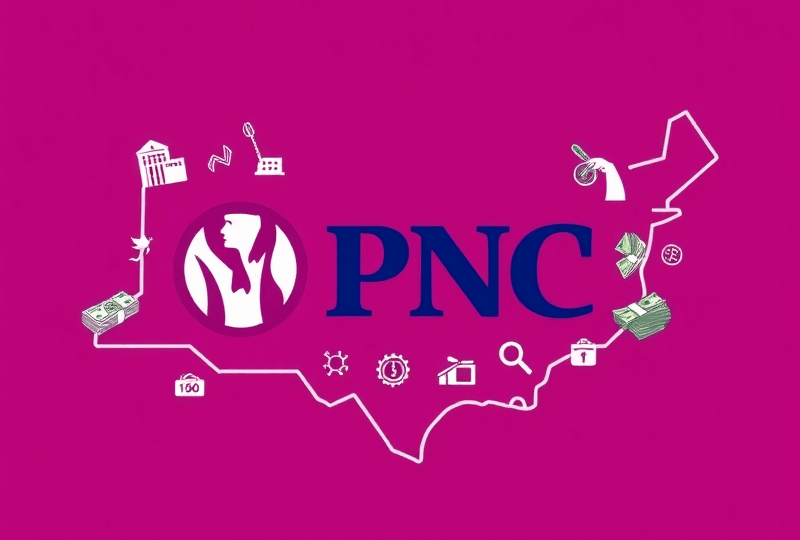
PNC Stock: Is This Regional Banking Powerhouse a Solid Addition to Your Portfolio?

diversified financial services institutions in the country, PNC provides a
wide array of banking, wealth management, and asset management services to
individuals, small businesses, and corporations. You might see their branches
in your community or use their online banking services. But when it comes to
their stock, what should you, as a potential investor, be thinking about? Is
PNC stock a stable, reliable investment in the banking sector, or does its
performance come with the unique dynamics facing regional banks
today?
Investing in a major bank like PNC means investing in a company
whose performance is deeply tied to the health of the economy, interest
rates, and consumer and business lending activity within its operating regions.
Banks make money primarily from the difference between the interest they earn
on loans and investments and the interest they pay on deposits (this is
called net interest income). They also earn revenue from fees for various
services like payment processing, wealth management, and account services.
Understanding these core revenue drivers and how they are impacted by the
broader economic environment is crucial to evaluating PNC stock. Let’s dive
deeper and see what the current picture looks like for this regional banking
powerhouse.
PNC operates through several key business segments, including
Retail Banking, Corporate & Institutional Banking, and Asset Management
Group. The Retail Banking segment serves individual consumers and small
businesses through its extensive branch network, ATMs, and digital channels,
offering checking and savings accounts, loans, and other services. Corporate
& Institutional Banking provides lending, treasury management, and capital
markets services to mid-sized and large corporations. The Asset Management
Group offers wealth management, private banking, and asset management
services to individuals and institutions. This diversified structure allows
PNC to generate revenue from different sources within the financial
ecosystem, although traditional lending and deposit-taking remain central to
its operations.
Understanding PNC’s Core Business and Revenue
Drivers
As a commercial bank, PNC’s profitability is heavily influenced by
interest rates. When interest rates rise, the bank can often earn more on its
loans and investments than it pays on deposits, increasing its net interest
income. Conversely, falling rates can put pressure on this key revenue
source. The volume and quality of loans are also critical; a strong economy
with healthy consumer and business spending leads to increased loan demand,
while an economic downturn can lead to higher loan defaults. Fee-based income
from services like treasury management, asset management, and payment
processing provides a more stable revenue stream that helps diversify
earnings away from interest rate sensitivity and credit risk. PNC’s scale as
a large regional bank allows it to compete effectively in its core
markets.
Recent Financial Performance and Key Metrics
Looking at recent financial data provides insight into PNC’s
performance. The company has a substantial market capitalization of USD 70.31
billion. Over the trailing twelve months (TTM), PNC generated revenue of USD
21.01 billion and a net income of USD 5.66 billion. This results in an EPS
(TTM) of USD 14.15. These figures indicate that PNC is a large and profitable
financial institution. The stock price recently traded around USD 177.74 as
of June 11, 2025, showing a slight decrease of -0.93% on that day. Over the
past year, PNC underperformed the US Banks industry which returned 25.7%, but
it exceeded the US Market. This suggests that while the banking sector as a
whole performed strongly, PNC lagged behind its direct peers, but still did
better than the overall market.
Analyst Sentiment and Price Targets: What the Experts
Say
What do the experts think about PNC stock? While specific analyst
ratings and price targets weren’t detailed in the immediate search results,
the company is widely covered by financial analysts who follow the banking
sector. Generally, analyst sentiment for regional banks like PNC is
influenced by interest rate expectations, the economic outlook for their
operating regions, loan growth prospects, credit quality trends, and the
company’s efficiency initiatives. The fact that the stock underperformed the
US Banks industry over the past year might lead some analysts to be more
cautious, while others might see it as a potential value opportunity if they
believe the underperformance was temporary or that the company is poised for
improvement. Investors should look for recent analyst reports for detailed
price targets and ratings.
The Impact of Interest Rates and Economic
Conditions
PNC’s profitability is highly sensitive to the level and direction
of interest rates set by the Federal Reserve. Higher rates can boost net
interest income, while lower rates can squeeze margins. The overall health of
the U.S. economy, particularly in the regions where PNC operates, also plays
a crucial role. A strong economy leads to increased demand for loans and
lower credit losses, benefiting the bank. Conversely, an economic slowdown or
recession can lead to decreased loan demand, higher unemployment, and
increased loan defaults, negatively impacting the bank’s financials. The
bank’s ability to manage its balance sheet, including its loan portfolio and
deposit base, effectively in different economic and interest rate
environments is key to its performance.
PNC’s Position in the Competitive Landscape
PNC operates in a highly competitive banking environment. It
competes with other large national banks, other regional banks in its
operating footprint, community banks, credit unions, and increasingly,
fintech companies offering various financial services. Competition is intense
for deposits, loans, and fee-based services. PNC differentiates itself
through its extensive branch network in its core geographic markets, its
diversified business lines (including a strong corporate banking and asset
management presence), its focus on efficiency, and its reputation as a
well-managed financial institution. Maintaining this competitive edge
requires continuous investment in technology, enhancing the customer
experience, and managing risk effectively.
Future Outlook and Strategic Initiatives
What does the future hold for PNC? The company is focused on
growing its core banking businesses, expanding its presence in key markets,
enhancing its digital capabilities, and managing its balance sheet
effectively in the current interest rate environment. The outlook for PNC is
tied to the future trajectory of interest rates, the health of the U.S.
economy, and the company’s ability to continue attracting deposits and making
quality loans. Continued growth in its core markets, expansion of its
fee-based businesses, and successful management of credit risk could drive
future performance. While it underperformed the industry recently, its
performance exceeding the broader market suggests underlying resilience. The
company’s strategic focus on efficiency and technology is crucial for
long-term competitiveness.
Risks and Opportunities for PNC Investors
Investing in PNC stock involves considering both potential risks
and opportunities. Opportunities include benefiting from favorable interest
rate environments boosting net interest income, continued economic growth
leading to increased loan demand and lower credit losses, growth in its
fee-based segments like asset management and corporate services, and
potential stock price appreciation if the company improves its performance
relative to the banking industry. Risks include potential decreases in
interest rates negatively impacting net interest income, economic downturns
leading to increased loan defaults, intense competition putting pressure on
margins, and potential regulatory changes. The stock’s performance is
sensitive to these factors.
Why PNC Financial Services Group (PNC) Might Fit Into Your
Portfolio
For investors seeking exposure to the U.S. banking sector,
particularly a large, diversified regional bank with a strong presence in its
core markets, PNC presents a compelling case. It is a profitable company with
significant revenue and net income. Its business benefits from economic
growth and interest rate trends. While it underperformed the banking industry
over the past year, its performance exceeding the broader market suggests a
degree of stability. If you believe in the continued health of the U.S.
economy and the resilience of the banking sector, and if the stock’s current
valuation and prospects align with your investment strategy, PNC could be a
valuable addition to a diversified portfolio. It’s a play on the financial
engine of key U.S. regions.
Key Takeaways for Potential PNC Investors
To sum it up, The PNC Financial Services Group (PNC) is a major
U.S. regional bank with diversified business lines serving retail, corporate,
and institutional clients. The company is large and profitable, with
significant revenue and net income. While its performance is closely tied to
interest rates and economic conditions, and it recently underperformed its
industry peers, PNC’s established position and diversified model provide a
strong foundation. For investors interested in the banking sector,
particularly a leading regional player, PNC warrants careful consideration.
Remember to conduct your own thorough research, understand the risks and
opportunities, and ensure any investment aligns with your personal financial
situation and goals. Wishing you the best in your investment journey! 😊







